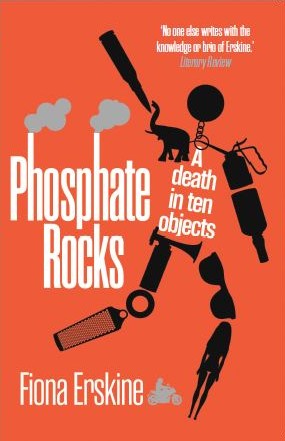“During the demolition of a factory, a shocking discovery is made: a mummified corpse encased in a carapace of hardened dust – phosphate rock – surrounded by ten objects that provide tantalising clues as to its identity…”

That’s the backstory to Phosphate rocks, but the story is really just an excuse for Erskine to paint a dark, rain-soaked, but surprisingly warm and loving picture of a Scottish fertiliser plant and the people who worked there. The ten objects are not so much clues as triggers for John, the main protagonist, to reminisce about the old days in the factory. These portraits of workers, prostitutes and stevedores down by the docks of Leigh form the central part of the mystery, as presumably one of them is the unidentified dead body found in the factory basement. However, each of the objects is also intricately tied to a chemical used in the plant. We are given both historical backgrounds and descriptions of the factory processes involving these compounds.
I am not a chemical engineer, so to me, these interludes give an insight into the complicated inner workings of a chemical plant. But, they also detract from the flow of the story. They take up well over half of the book (and far more if the numerous endnotes are included.), and in the end, neither the chemistry nor the objects have much bearing on the solution to the mystery! Phosphate rocks is not a murder mystery with some chemistry snuck in – it’s an engineering handbook with a mystery tacked on.
I’m not sure what I expected from Phosphate Rocks1 The portraits of the people at the plant are written with great sympathy and Erskine manages to convey the atmosphere of the factory so that I can both hear and smell it. The events described in these flashbacks are presumably based on reality. Finally, I do know a bit more about how sulphuric acid is made industrially, but that wasn’t quite what I signed up for.